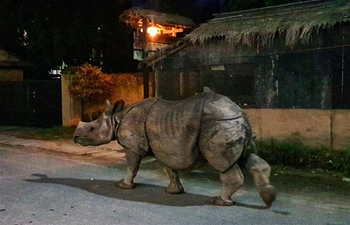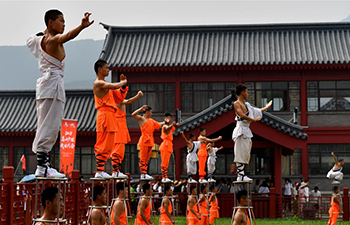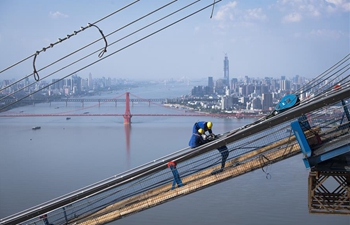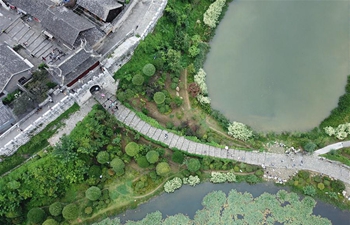
U.S. Ambassador to the United Nations Nikki Haley (C, Front) speaks before the Security Council voting on a resolution to impose an arms embargo on South Sudan at the UN headquarters in New York, on July 13, 2018. The UN Security Council on Friday adopted a resolution to impose an arms embargo on South Sudan in addition to current sanctions, till May 31, 2019. (Xinhua/Li Muzi)
UNITED NATIONS, July 13 (Xinhua) -- The UN Security Council on Friday adopted a resolution to impose an arms embargo on South Sudan in addition to current sanctions, till May 31, 2019.
Resolution 2428 won nine votes in favor, the minimum requirement for adoption. The remaining six members of the Security Council -- Bolivia, China, Equatorial Guinea, Ethiopia, Kazakhstan and Russia -- abstained.
To be adopted, a Security Council resolution needs nine votes in favor and no veto from any of the five permanent members of the council -- Britain, China, France, Russia and the United States.
Resolution 2428 renews a travel ban and asset freeze against designated individuals and entities till May 31, 2019. It also renews the mandate of the Panel of Experts, who assist the work of the sanctions committee, until July 1, 2019.
The resolution adds two individuals to the blacklist for travel ban and asset freeze. They are Malek Reuben Riak Rengu, a former deputy chief of staff of South Sudan's army, and Paul Malong Awan, the former chief of staff of South Sudan's army, who rebelled last year.
The resolution expresses deep concern at the failures of South Sudanese leaders to bring an end to the hostilities and condemns the continued and flagrant violations of previous peace agreements.
The Security Council adopted a U.S.-drafted resolution on May 31 to renew South Sudan sanctions temporarily till July 15, 2018, to allow time for the introduction of an arms embargo unless the parties stop fighting and agree on a viable political agreement.
A recent report of UN Secretary-General Antonio Guterres said fighting did not stop in South Sudan.
Before the vote, Ethiopian Ambassador to the United Nations Tekeda Alemu, whose country is leading regional efforts to revitalize the South Sudan peace process, told the Security Council that the timing for the introduction of an arms embargo is not right and asked members not to vote for the U.S. draft.
The peace process in South Sudan is at a very critical juncture and for the first time in a long while there is some hope for a possible breakthrough, said the ambassador.
The introduction of an arms embargo at this juncture would have serious implications and cause confusion among the parties in South Sudan, he argued.
"That is why we find it difficult to vote in favor of the this draft resolution, why, in our view, other council members should not, as well."
U.S. ambassador to the United Nations Nikki Haley, who spoke before the Ethiopian ambassador, was trying to push the draft through, arguing that the arms embargo is a measure to protect civilians and help stop the violence.
"Peace in South Sudan will not come by letting the parties get their hands on more weapons. The opposite is true. Supporting an arms embargo will show the parties that we are fed up with the delays and the stalling (in the peace process). It will show our resolve to make life better for the people of South Sudan," she told the council.
"We can come together to show South Sudan that the era of impunity is over. We can show the world that the Security Council will live up to its responsibility to help maintain international peace and security. Above all, we can send a small signal of hope to the people of South Sudan."
Shortly after its independence from Sudan in 2011, South Sudan plunged into civil war. Up to 300,000 people are estimated to have been killed since late 2013. More than 1.5 million people have fled to neighboring countries, and many more are internally displaced. The UN sanctions have been in place since 2015.















